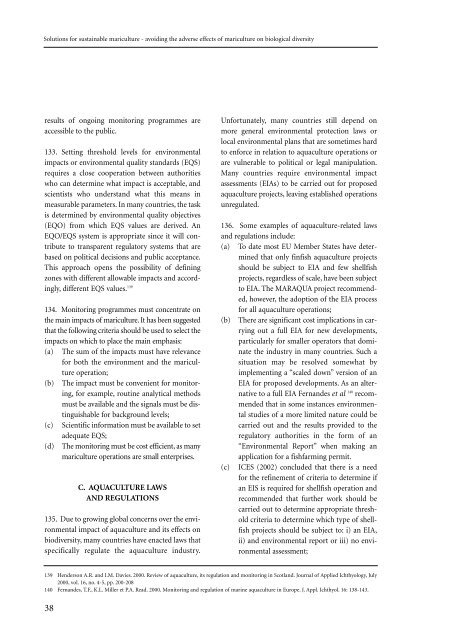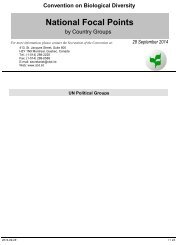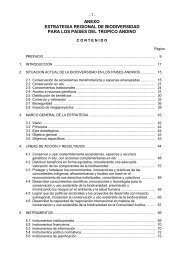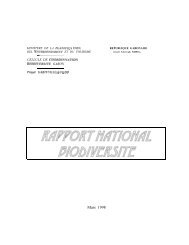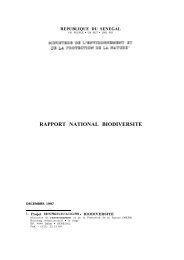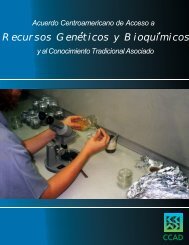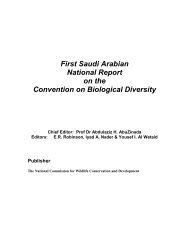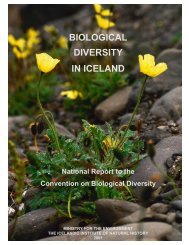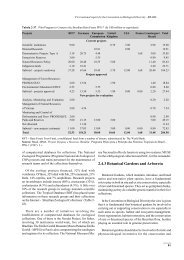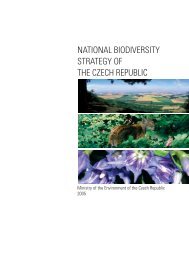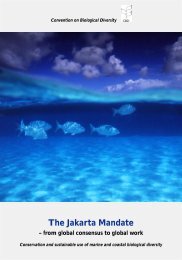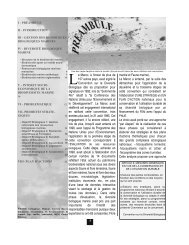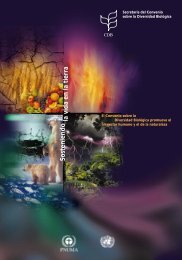Solutions for sustainable mariculture - Convention on Biological ...
Solutions for sustainable mariculture - Convention on Biological ...
Solutions for sustainable mariculture - Convention on Biological ...
- No tags were found...
You also want an ePaper? Increase the reach of your titles
YUMPU automatically turns print PDFs into web optimized ePapers that Google loves.
<str<strong>on</strong>g>Soluti<strong>on</strong>s</str<strong>on</strong>g> <str<strong>on</strong>g>for</str<strong>on</strong>g> <str<strong>on</strong>g>sustainable</str<strong>on</strong>g> <str<strong>on</strong>g>mariculture</str<strong>on</strong>g> - avoiding the adverse effects of <str<strong>on</strong>g>mariculture</str<strong>on</strong>g> <strong>on</strong> biological diversityresults of <strong>on</strong>going m<strong>on</strong>itoring programmes areaccessible to the public.133. Setting threshold levels <str<strong>on</strong>g>for</str<strong>on</strong>g> envir<strong>on</strong>mentalimpacts or envir<strong>on</strong>mental quality standards (EQS)requires a close cooperati<strong>on</strong> between authoritieswho can determine what impact is acceptable, andscientists who understand what this means inmeasurable parameters. In many countries, the taskis determined by envir<strong>on</strong>mental quality objectives(EQO) from which EQS values are derived. AnEQO/EQS system is appropriate since it will c<strong>on</strong>tributeto transparent regulatory systems that arebased <strong>on</strong> political decisi<strong>on</strong>s and public acceptance.This approach opens the possibility of definingz<strong>on</strong>es with different allowable impacts and accordingly,different EQS values. 139134. M<strong>on</strong>itoring programmes must c<strong>on</strong>centrate <strong>on</strong>the main impacts of <str<strong>on</strong>g>mariculture</str<strong>on</strong>g>. It has been suggestedthat the following criteria should be used to select theimpacts <strong>on</strong> which to place the main emphasis:(a) The sum of the impacts must have relevance<str<strong>on</strong>g>for</str<strong>on</strong>g> both the envir<strong>on</strong>ment and the <str<strong>on</strong>g>mariculture</str<strong>on</strong>g>operati<strong>on</strong>;(b) The impact must be c<strong>on</strong>venient <str<strong>on</strong>g>for</str<strong>on</strong>g> m<strong>on</strong>itoring,<str<strong>on</strong>g>for</str<strong>on</strong>g> example, routine analytical methodsmust be available and the signals must be distinguishable<str<strong>on</strong>g>for</str<strong>on</strong>g> background levels;(c) Scientific in<str<strong>on</strong>g>for</str<strong>on</strong>g>mati<strong>on</strong> must be available to setadequate EQS;(d) The m<strong>on</strong>itoring must be cost efficient, as many<str<strong>on</strong>g>mariculture</str<strong>on</strong>g> operati<strong>on</strong>s are small enterprises.C. AQUACULTURE LAWSAND REGULATIONS135. Due to growing global c<strong>on</strong>cerns over the envir<strong>on</strong>mentalimpact of aquaculture and its effects <strong>on</strong>biodiversity, many countries have enacted laws thatspecifically regulate the aquaculture industry.Un<str<strong>on</strong>g>for</str<strong>on</strong>g>tunately, many countries still depend <strong>on</strong>more general envir<strong>on</strong>mental protecti<strong>on</strong> laws orlocal envir<strong>on</strong>mental plans that are sometimes hardto en<str<strong>on</strong>g>for</str<strong>on</strong>g>ce in relati<strong>on</strong> to aquaculture operati<strong>on</strong>s orare vulnerable to political or legal manipulati<strong>on</strong>.Many countries require envir<strong>on</strong>mental impactassessments (EIAs) to be carried out <str<strong>on</strong>g>for</str<strong>on</strong>g> proposedaquaculture projects, leaving established operati<strong>on</strong>sunregulated.136. Some examples of aquaculture-related lawsand regulati<strong>on</strong>s include:(a) To date most EU Member States have determinedthat <strong>on</strong>ly finfish aquaculture projectsshould be subject to EIA and few shellfishprojects, regardless of scale, have been subjectto EIA. The MARAQUA project recommended,however, the adopti<strong>on</strong> of the EIA process<str<strong>on</strong>g>for</str<strong>on</strong>g> all aquaculture operati<strong>on</strong>s;(b) There are significant cost implicati<strong>on</strong>s in carryingout a full EIA <str<strong>on</strong>g>for</str<strong>on</strong>g> new developments,particularly <str<strong>on</strong>g>for</str<strong>on</strong>g> smaller operators that dominatethe industry in many countries. Such asituati<strong>on</strong> may be resolved somewhat byimplementing a “scaled down” versi<strong>on</strong> of anEIA <str<strong>on</strong>g>for</str<strong>on</strong>g> proposed developments. As an alternativeto a full EIA Fernandes et al 140 recommendedthat in some instances envir<strong>on</strong>mentalstudies of a more limited nature could becarried out and the results provided to theregulatory authorities in the <str<strong>on</strong>g>for</str<strong>on</strong>g>m of an“Envir<strong>on</strong>mental Report” when making anapplicati<strong>on</strong> <str<strong>on</strong>g>for</str<strong>on</strong>g> a fishfarming permit.(c) ICES (2002) c<strong>on</strong>cluded that there is a need<str<strong>on</strong>g>for</str<strong>on</strong>g> the refinement of criteria to determine ifan EIS is required <str<strong>on</strong>g>for</str<strong>on</strong>g> shellfish operati<strong>on</strong> andrecommended that further work should becarried out to determine appropriate thresholdcriteria to determine which type of shellfishprojects should be subject to: i) an EIA,ii) and envir<strong>on</strong>mental report or iii) no envir<strong>on</strong>mentalassessment;139 Henders<strong>on</strong> A.R. and I.M. Davies. 2000. Review of aquaculture, its regulati<strong>on</strong> and m<strong>on</strong>itoring in Scotland. Journal of Applied Ichthyology, July2000, vol. 16, no. 4-5, pp. 200-208140 Fernandes, T.F., K.L. Miller et P.A. Read. 2000. M<strong>on</strong>itoring and regulati<strong>on</strong> of marine aquaculture in Europe. J. Appl. Ichthyol. 16: 138-143.38


